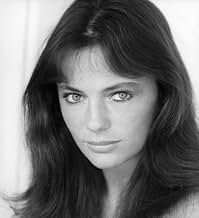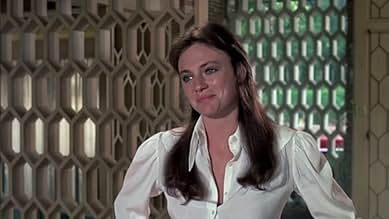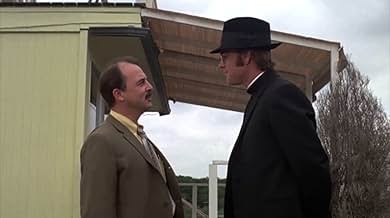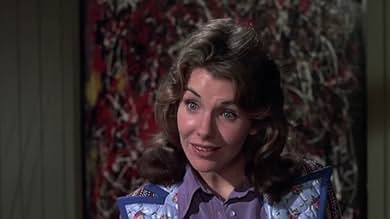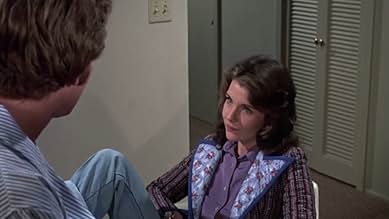IMDb RATING
6.1/10
1.4K
YOUR RATING
A computer programmer decides to become a thief. And when he starts making waves an insurance investigator hounds him. He also meets a woman who becomes his accomplice.A computer programmer decides to become a thief. And when he starts making waves an insurance investigator hounds him. He also meets a woman who becomes his accomplice.A computer programmer decides to become a thief. And when he starts making waves an insurance investigator hounds him. He also meets a woman who becomes his accomplice.
- Director
- Writers
- Stars
- Director
- Writers
- All cast & crew
- Production, box office & more at IMDbPro
Featured reviews
Ryan O'Neal's performance in "The Thief Who Came to Dinner" (1973) reflects mature professionalism. The story is agreeable enough: Computer programmer Mr. Straight abruptly quits his job to become a jewel-thief.
Walter Hill authored this script before beginning his directorial career. Here, his work takes on a more ironic tone than the stone-cold nature of his other accomplishments ("The Driver," "The Warriors," the screenplay for Peckinpah's "The Getaway"). But when Hill works tongue-in-cheek, as in parts of "The Long Riders" and all of "48 Hours," the results can be crafty and diverting. Here, the jokes don't always work, but one can still appreciate the intelligence behind them.
"Thief" was directed by Bud Yorkin, known primarily for his association with TV producer Norman Lear ("All In The Family"). As a moviemaker, Yorkin falls down on the job. He has a pedestrian talent for setting up visual gags, but there's no payoff. Where the film calls for laughter, there's only a chuckle. Not that "Thief" needed a comic genius behind the camera, but this movie should have been a whole lot better.
Walter Hill authored this script before beginning his directorial career. Here, his work takes on a more ironic tone than the stone-cold nature of his other accomplishments ("The Driver," "The Warriors," the screenplay for Peckinpah's "The Getaway"). But when Hill works tongue-in-cheek, as in parts of "The Long Riders" and all of "48 Hours," the results can be crafty and diverting. Here, the jokes don't always work, but one can still appreciate the intelligence behind them.
"Thief" was directed by Bud Yorkin, known primarily for his association with TV producer Norman Lear ("All In The Family"). As a moviemaker, Yorkin falls down on the job. He has a pedestrian talent for setting up visual gags, but there's no payoff. Where the film calls for laughter, there's only a chuckle. Not that "Thief" needed a comic genius behind the camera, but this movie should have been a whole lot better.
I have loved this movies for years and wish it were on DVD. Ryan O'Neal gives his career best performance as the amateur thief who decides that this way of life is more exciting than what he did before. The Houston location is interesting and the capers themselves are hair-raising. The addition of the chess motif and the relationship between Warren Oates and O'Neal was almost touching. The ending makes you see how much the O'Neal character liked the detective played by Oates.The film also contains one of my favorite lines of dialog as well. When Bissett asks O'Neal what it is like to rob a house, he answers :" It's like a heart attack with a lot of fear thrown in"
In 1973, the best chess programs running on the fastest supercomputers could barely play a passable game of chess, much less challenge a master level player such as the Austin Pendleton character would be (newspaper chess columnist for the Houston Chronicle).
Considering that its been close to forgotten, TTWCTD was a pleasant and substantial surprise when I watched it a few years ago.
This is far from a perfect film as it has several flaws. While the caper scenes involving central character Webster McGee's (Ryan O'Neal) are entertaining enough they're hardly groundbreaking and have been done better in other films. And as another reviewer said, the film probably could've done without the segment involving the arrogant chess expert Zukovsky (played by Austin Pendelton). While not without humour, in the context of the rest of the film it's played too broadly by Pendelton and doesn't really fit in.
But there is much of interest in this film that make it well worth catching up with. The central romance between O'Neal and wealthy socialite Jackie (who gives him his chance to move into the upper echelons of society) played by Jacqueline Bisset isn't really that convincing, perhaps deliberately so. McGee's attraction to the vacuous and cold Laura only makes sense in the context of Jill Clayburgh's performance as McGee's ex-wife Jackie. In her brief on-screen time, Jackie comes across as a far more likable persona then the cold and chilly Laura (doubtless this is also because Bisset has always come across as a cold and unlikable personality for mine). But we can see in Jackie's one scene with Webster that she has tics and neuroses that remind Webster of his past and he has moved on with someone far more frivolous and insubstantial.
But the really fascinating part of the film is the relationship between McGee and the insurance investigator Dave Riley. If this film were made today, Riley would most likely be portrayed as a harried, bumbling 'loser' with McGee (and the filmmakers) regularly mocking his failure to catch him at every turn.
But TTWCTD does something highly unusual and daring. It has McGee display immense sympathy and empathy for Riley even as he's doing his best to catch him. Why? Because he knows that he was just like him previously - someone stuck in a dead-end job trying to do their best but feeling immensely dissatisfied about their life and feeling helpless to do anything about it.
It's this relationship which is the real strength of the film, helped especially by Oates' marvellous performance as Riley and helps it stay in the memory long after one has finished watching it.
And while it has its detractors, I also found Henry Mancini's music score very pleasing on the ear.
This is far from a perfect film as it has several flaws. While the caper scenes involving central character Webster McGee's (Ryan O'Neal) are entertaining enough they're hardly groundbreaking and have been done better in other films. And as another reviewer said, the film probably could've done without the segment involving the arrogant chess expert Zukovsky (played by Austin Pendelton). While not without humour, in the context of the rest of the film it's played too broadly by Pendelton and doesn't really fit in.
But there is much of interest in this film that make it well worth catching up with. The central romance between O'Neal and wealthy socialite Jackie (who gives him his chance to move into the upper echelons of society) played by Jacqueline Bisset isn't really that convincing, perhaps deliberately so. McGee's attraction to the vacuous and cold Laura only makes sense in the context of Jill Clayburgh's performance as McGee's ex-wife Jackie. In her brief on-screen time, Jackie comes across as a far more likable persona then the cold and chilly Laura (doubtless this is also because Bisset has always come across as a cold and unlikable personality for mine). But we can see in Jackie's one scene with Webster that she has tics and neuroses that remind Webster of his past and he has moved on with someone far more frivolous and insubstantial.
But the really fascinating part of the film is the relationship between McGee and the insurance investigator Dave Riley. If this film were made today, Riley would most likely be portrayed as a harried, bumbling 'loser' with McGee (and the filmmakers) regularly mocking his failure to catch him at every turn.
But TTWCTD does something highly unusual and daring. It has McGee display immense sympathy and empathy for Riley even as he's doing his best to catch him. Why? Because he knows that he was just like him previously - someone stuck in a dead-end job trying to do their best but feeling immensely dissatisfied about their life and feeling helpless to do anything about it.
It's this relationship which is the real strength of the film, helped especially by Oates' marvellous performance as Riley and helps it stay in the memory long after one has finished watching it.
And while it has its detractors, I also found Henry Mancini's music score very pleasing on the ear.
Look, this is 2010 or later. You've checked out Serpico, Mean Streets, The Godfather---all the obvious choices. But I just watched The Thief Who Came to Dinner last night, and it made me realize that there's probably a lot I've been missing. A lot of terrific movies that were maybe ignored or under-estimated when they first came out (for some reason or another) that are actually pretty great.
Let me put it to you this way. if you're a guy (or a gal) with a sort of boring job, who's occasionally fantasized about chucking it all and just becoming a professional jewel thief---this is the movie you want to live in. Ryan O'Neal is handsome and charming, Jacqueline Bisset is beautiful, and Warren Oates is very Warren Oates-y. The story(by Walter hill, based on a novel) works, and you won't be left hanging by some typical early 70's drag ending (thank God)---I don't know what else to say. The Thief Who came to Dinner is a really good time. It should have made $100 million dollars in 1973. It's a tragedy (possible slight overstatement) that it didn't.
Let me put it to you this way. if you're a guy (or a gal) with a sort of boring job, who's occasionally fantasized about chucking it all and just becoming a professional jewel thief---this is the movie you want to live in. Ryan O'Neal is handsome and charming, Jacqueline Bisset is beautiful, and Warren Oates is very Warren Oates-y. The story(by Walter hill, based on a novel) works, and you won't be left hanging by some typical early 70's drag ending (thank God)---I don't know what else to say. The Thief Who came to Dinner is a really good time. It should have made $100 million dollars in 1973. It's a tragedy (possible slight overstatement) that it didn't.
Did you know
- TriviaJacqueline Bisset took over the role of Laura from Charlotte Rampling, who bowed out because of pregnancy. [VARIETY, Mar 15, 1972]
- GoofsTravis is pulled over by police and is asked for the car's registration. In the 1970s, Texas did not require that the registration be kept in the car, and officers did not ask for it. Hollywood got it wrong because in California drivers were required to present their "registration".
- ConnectionsFeatured in Gazap Rüzgari (1983)
- How long is The Thief Who Came to Dinner?Powered by Alexa
Details
- Release date
- Country of origin
- Language
- Also known as
- Webster ist nicht zu fassen
- Filming locations
- Production company
- See more company credits at IMDbPro
Box office
- Gross US & Canada
- $679,839
Contribute to this page
Suggest an edit or add missing content

